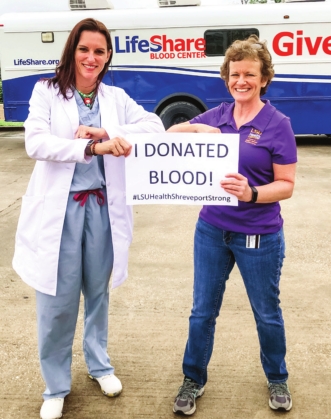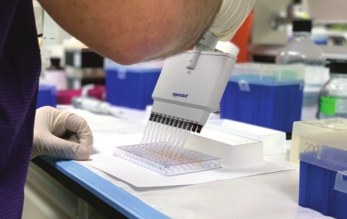LSU Health Shreveport

students, faculty and staff have not hesitated to answer the call and address the needs of our community, state and country as a result of the COVID-19 pandemic. In addition to LSU Health Shreveport faculty physicians, residents and fellows providing patient care around the state, and students donating much needed blood and forming volunteer networks to help frontline health-care workers with their everyday needs outside of work, the researchers and basic science faculty members at the health sciences center are also using their experience and expertise to make a significant impact on the fight against COVID-19 in Louisiana when it comes to testing and potential treatments.
Emerging Viral Threat Lab 
With the support of Gov. John Bel Edwards and the Centers for Medicare and Medicaid (CMS), scientists at LSU Health Shreveport have established the Emerging Viral Threat (EVT) Laboratory to address the need for faster detection and processing of COVID-19 tests. This lab went from an idea by Dr. Andrew Yurochko to testing samples in just 13 days. The EVT Lab is receiving samples from all over the state and has the capability to accept out-of-state samples. This lab is different from any other laboratory in the state because it is not only testing to determine if a patient is COVID-19 positive, but is also screening samples for other mutations of the virus. The EVT Lab was, and continues to be, a true team effort of many people from a variety of specialties and is directed by Dr. Rona Scott.
“LSU Health Shreveport is proud to have nationally and internationally renowned NIH-funded virologists on our faculty. Creation of the Emerging Viral Threat (EVT) laboratory brings together numerous regional experts to provide urgently needed COVID-19 testing solutions while allowing our community and state to be prepared for future viral threats when they occur,” said Chris Kevil, Ph. D., vice chancellor for research at LSU Health Shreveport.
“I am grateful to all those involved in securing and granting the approvals required to stand up this needed lab so quickly. Our research leadership, faculty and staff have worked tirelessly to reach the milestone of processing COVID-19 tests starting. Their efforts will play a key role in addressing the impact of this virus on the citizens of Louisiana,” stated G. E. Ghali, MD, DDS, FACS, FRCS (Ed), LSU Health Shreveport chancellor.
Data obtained from samples tested in the EVT Lab will be used for further COVID-19 research to better determine how to combat the virus, and the EVT Lab is already supporting multiple clinical trials.
The EVT Lab can be contacted at evtlab@lsuhsc.edu.
Clinical Trials & Serology Testing
LSU Health Shreveport was the first institution in Louisiana and the second in the U.S. to offer an inhaled nitric oxide clinical trial, joining Harvard University and the University of Alabama at Birmingham, and LSUHS researchers assisted in administering the first convalescent plasma therapy to a COVID-19 patient in Louisiana.
The international inhaled nitric oxide clinical trial is testing using inhaled nitric oxide to improve outcomes for COVID-19 patients with severely damaged lungs using gas to effectively “kill” coronavirus in the lungs and improve delivery of oxygen to injured tissues.
“This is a wonderful collaboration with two highly regarded institutions in the U.S. as well as the sites in Europe. We have tremendous confidence this therapy will alter the devastating effects of COVID-19, but we must test it. If results show promise, and since this gas is already FDA-approved, widespread use could begin immediately,” shared Keith Scott, MD, MSc, FCCM, principal investigator for the nitric oxide clinical trial. “I am fortunate to have my esteemed colleague Steven Conrad, MD, Ph.D., MS, ME, MBA, MSST, MSC working alongside me on this trial as he brings immense research experience and knowledge in working with critically ill patients.”
In humans, nitric oxide is naturally generated by blood vessels and by some brain cells as well. It helps to regulate blood pressure, engulfs invading toxins, and prevents platelets in the blood from forming clots that may be significantly compromised during times of stress, including infection, thus warranting the need for a supplemental supply. When inflammation, emphysema or a disease like cystic fibrosis attacks the lungs, the large blood vessels and tiny capillaries that deliver oxygen constrict. Inhaled nitric oxide also relaxes those vessels, increasing the transfer of oxygen to the blood and easing the heart’s workload.
The most recent accomplishment by LSU Health Shreveport researchers is the capability to offer serology testing. Serology testing is in high demand to be able to better determine the number of COVID-19 cases that include those people who have already recovered and were asymptomatic. The Emerging Viral Threat Lab is already working with LifeShare Blood Center to identify blood plasma suitable for Convalescent Plasma Therapy (CPT) for COVID-19 patients, and LSUHS will be conducting serology testing to support the CPT clinical trial and help identify ideal plasma donors. This investigative therapy uses convalescent plasma from individuals who have recovered from the virus, which could possibly contain COVID-19 antibodies and might be effective in treating those who are currently fighting the infection.
“The serology lab will aid the Convalescent Plasma Therapy that is ongoing at LSU Health Shreveport. By identifying the amount of antibody in donated plasma, we can select the most effective plasma to be used in patients,” said Matthew Woolard, PhD, O’Callaghan Family Endowed Professor in Microbiology and associate professor in the Department of Microbiology and Immunology. “In the future, we hope to use this serology assay to better determine who has been infected and understand the scope of the COVID-19 pandemic in Northwest Louisiana.”
At this time, the serology testing is only available to be performed on possible CPT donor samples. Physicians who are interested in a patient accessing this clinical trial can email ino_trial@lsuhsc.edu with pertinent patient details.
In addition to research, LSU Health Shreveport has responded to the COVID-19 pandemic by:
• Sending a group of resident volunteers led by Dr. Angela Cornelius, associate professor of emergency medicine, to serve in New Orleans and provide requested relief for this hot zone area of COVID-19 cases.
• Responding to the call from Gov.Edwards to create public service announcements (PSAs) for both TV and radio in north Louisiana to educate the public on the importance of physical distancing and staying at home.
• Encouraging the community and those able to donate blood due to the blood supply shortage. LSUHS students, faculty and staff in Shreveport and Monroe have donated more than 75 known units of blood.
• Graduating all 124 medical students in Shreveport early, positioning them to join the health-care workforce both in Louisiana and elsewhere.
• Creating 3D-printed full-face masks and shields being worn by staff in the EVT Lab and developing low-cost ventilator options that also use 3D-printed components that are easy to assemble without needing special equipment, a lab or machining, conceived particularly for use in rural, remote areas that are not well connected to distribution channels.
• Coordinating COVID-19 testing in rural areas of North Louisiana by repurposing mobile vans previously used for cancer screenings, which is supported by $175,000 in funding from the Caddo Commission and a $125,000 anonymous donor.
